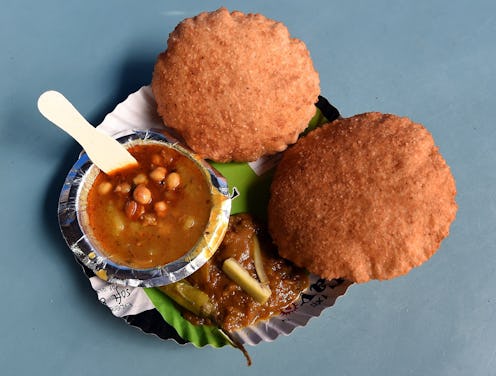Life
This Delish AF Superfood Will Take Your Home Cooking Game To The Next Level

Much to the surprise of anybody who came of age in the 1990s, where butter of any kind was seen as antithetical to a healthy diet, ghee — the clarified butter product that's been a staple of Indian cooking for centuries — is having a moment. Increasingly, science has been demonstrating that various forms of fats, like ghee, seem to have a complex effect on human health, combining challenges with potential advantages. Moreover, professional chefs and home cooks alike are looking for alternative ingredients that both taste great and aren't totally awful for you — and that's where ghee comes in.
It's always important to qualify food trends. Anything that claims to be the next "superfood" should probably learn from the first modern over-hyped health food, spinach. It was thought to be amazingly good for you thanks to high vitamin A and iron content, but while the vitamin A element is true, the iron content was the product of mistaken science in the 1870s. That being said, it's not like spinach is bad for you. Ghee, similarly to butter, got a bad rep after some findings in the '80s and '90s, but as people expand their palates (and science has changed its tune), they are looking for the next big thing. So what is ghee, and should you be cooking everything in it?
What Is Ghee?
Ghee itself is the product of heating cream or butter, skimming off the milk solids that collect on the top, and then storing the result. The result is a clear product with a high smoking point and a delicate, nutty flavor. Debbie Shandel, Chief Growth Officer of the organic natural foods company Carrington Farms, tells Bustle, "We source our organic butter from organic farms, gently heat it, and then skim off the milk proteins, including the lactose and casein. After filtering several times, the process results in an organic, creamy, buttery product that has many uses."
Anybody who grew up in an Indian household will be familiar with ghee, whether made from buffalo milk or cow milk, but ghee is making waves across the cooking world, too. It's easy to make on your own and has no milk or water solids, so some people who are lactose-intolerant feel it's a good alternative for butter for them. It's been part of the ancient medical system Ayurveda for thousands of years, stretching back to at least 800 BC; Ayurvedic medicine claims that ghee is good for everything from sleep quality to semen health, joint suppleness, intelligence, memory and wrinkles. Even in India, however, it experienced a drop in reputation from the 1980s onwards thanks to its high saturated fat content, and is only now coming back into vogue on the back of the "superfood" trend.
Ghee Is Healthy — Basically
A lactose-free butter alternative seems, on paper, like a really good idea. "There are many benefits of cooking with ghee," Shandel tells Bustle. "The first is that it is great for people who have dairy sensitivities, as it is casein and lactose-free. In addition, ghee is gluten-free and high in butyric acid, a short-chain fatty acid used in the body as an energy source and anti-inflammatory." She adds, "Our ghee is rich in essential fatty acids and Vitamins A, D and E." Vitamin A is particularly helpful for people with irritable bowel syndrome.
But is a diet involving ghee good for the body in general? Scientists have been looking at the effects of ghee on human diet and nutrition, and the results are intriguing. A 2010 review of ghee science in the International Quarterly Journal of Research In Ayurveda by scientists from Ohio State noted that animal studies of ghee have found a series of possible benefits, including decreases in cholesterol, low density lipoproteins and triglycerides (which are associated with cardiovascular disease), and a potential link between ghee and lower coronary heart disease risk. One study in 2016 found that ghee was better for cooking than sunflower oil when looking at antioxidants and liver protection, while another in 2013 found that it helped to protect against the development of fatty deposits in arteries. Multiple studies in 2015 found that ghee, particularly low-cholesterol ghee, seemed to improve general cholesterol levels. It's worth noting that virtually all of these studies were done on rats, not humans. But the qualities of ghee have attracted medical attention for other reasons; it was suggested in early 2017 that ghee might be a good way to administer chemotherapy, as it may help the chemo get into the body more efficiently.
But isn't ghee a saturated fat with clear issues for heart health? A study published in 2016 in the Journal of Clinical & Diagnostic Research set out to look at this belief. It looked at the heart health of 137 people across India and checked their consumption of ghee and mustard oil, and found that the results "do not support a conclusion of harmful effects of the moderate consumption of ghee in the general population, although it contains high level of saturated fat." Two studies on Indian volunteers, one in 2002 and another in 2005, suggest that if it makes up less than 10 percent of the diet, it has pretty negligible effects on cholesterol levels. Some people reacted differently, and the subjects were all vegetarians, young, and healthy.
Evidence appears to suggest that if you want some form of saturated fat in your diet, ghee is the best option for you. High levels will still hurt your heart, though, so keep it to a minimum, and you'll hopefully enjoy its deliciousness without encountering health difficulties.